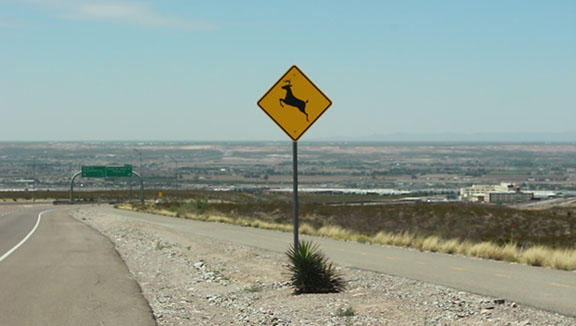Roadkill is not an uncommon sight along the rural roads and highways of the borderland. Yet, many people may not be aware of the hazards animal-vehicle collisions can cause.
Lois Balin, an urban wildlife biologist with the Texas Parks and Wildlife Department’s Urban Wildlife Program helps the El Paso community with professional planning guidance, management recommendations and research associated with wildlife. She said animal and vehicle encounters are not only traffic hazards, but can also pose health problems for a community.
“After a certain amount of time they are going to be filled with maggots and hopefully nobody is collecting these animals to eat,” Balin said.
Touching roadkill presents several health risks including contracting bacteria and viruses. Animals both big and small are a threat to safety on the road for automobile drivers.
“There is direct danger when they hit a big animal that they’re going to have an accident. People also swerve to avoid hitting animals and then they can hit another car or another person,” Balin said.
Texas Department of Transportation public affairs officer, Jennifer Wright agreed that swerving to avoid small animals can put road travelers at greater risk.
“If you’re driving along I-10 in this urban area and you see a dog or a cat on the highway, it pains me to say this, it’s safer to hit the animal than it is to swerve around it. As an animal lover it grieves me that that’s the consequence,” Wright said.
Proximity to the Franklin Mountains can bring encounters with larger animals, such as mule deer, in the city’s Westside neighborhoods that are close to the mountains. Dogs, birds and smaller mammals are the more common roadkill in the city. Birds tend to fly across roads, smashing into windshields.
“Snakes get hit a lot on the road. Even amphibians and other critters are searching for an area for food or water they may not have where they are so, they will cross the road looking for it somewhere else,” Balin said.
In a joint effort to mitigate habitat fragmentation and practice habitat conservation, the El Paso wildlife program and the Texas Department of Transportation worked together to build an underpass adjacent to Tom Mays Park near Transmountain Road. The area includes some fencing to try to direct wildlife to the underpass so that they can safely cross the highway.
During the spring and summer months, most animals begin breeding season, which can lead to greater road risks.
“In the breeding season the animals are probably going to be searching greater areas to get their food resources met to feed their young. So, they may be traveling more,” Balin explained. “Then after the breeding season, young animals cannot often occupy the same home range or territory as their parents so they have to find their own place to live,.”
TXDot helps with the cleanup of roadkill along Texas roadways.
“In rural areas when we come across animal carcasses, we will dispose of them by burying them in our right of way right along the side of the roadway,” Wright said.
To report roadkill on Texas highways, call Texas Department of Transportation at (915) 790-4200 or go to TxDot. The City of El Paso environment services department provides dead animal pick up for a fee. For more details, visit their website.

